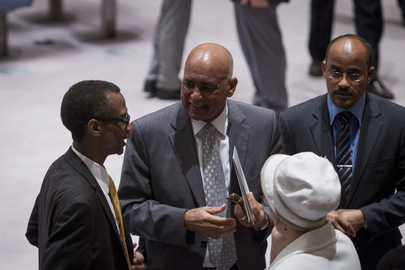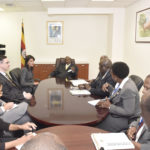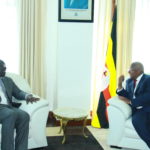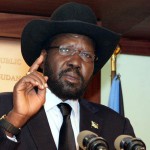The United Nations Security Council (UNSC) has extended the mandate of the African Union-United Nations Hybrid Operation in Darfur (UNAMID) until 30 June 2017, stressing that the situation in the western Sudan region continues to constitute a threat to international peace and security.
Despite Khartoum calls to withdraw UNAMID, the 15-member Council unanimously decided that UNAMID would maintain a deployment of up to 15,845 military forces, 1,583 police personnel and 13 formed police units of up to 140 personnel each in the Darfur region.
In its resolution 2296 (2016), the Council underlined that, in the context of limited progress on meeting benchmarks and ongoing insecurity, the mission must use its capacity and resources to protect civilians, deliver humanitarian assistance and meditate between the Government of Sudan and armed movements that had signed the Doha Document for Peace in Darfur.
The 15-member body, also, called on Darfur conflicting parties to immediately end the violence and commit themselves to a lasting ceasefire under the auspice of the African Union mediation team. Further it urged the Sudan Liberation Movement-Abdel Wahid to join the peace process without pre-conditions.
The resolution demanded the parties to create suitable conditions to allow the voluntary return of refugees and Internally Displaced Persons. It also demanded the cessation of sexual and gender-based violence.
Regarding the Darfur administrative referendum of April 2016, the council noted concern about voter eligibility and timing, however it welcomed the plebiscite which maintained the region’s five-state structure.
The new element in this year’s text is related to the exit strategy. The resolution has requested the Secretary-General to make recommendations within four months of the adoption of the resolution on practical steps that can be taken by all Sudanese parties with the support of UNAMID to achieve the mission’s benchmarks.
The achievement of the benchmarks is seen as a prerequisite for UNAMID’s exit, which Sudan continues to call for.
The benchmarks include an inclusive peace process between the government and the holdout armed groups; the protection of civilians, unhindered humanitarian access and the safety and security of humanitarian workers; and the prevention or mitigation of community conflict.
Further, the Council requested that the Secretary-General report on the political, humanitarian and security situation in Darfur, on violations of the status-of-forces agreement, and on progress towards the attainment of UNAMID’s strategic priorities.
Sudan’s supporters, like Russia and China worked to amend the draft resolution which was prepared by the United Kingdom (UK). The Russian Ambassador described the adopted text as a balanced outcome of intensive consultations. While the Chinese envoy praised the successful holding of the referendum, and said the Government was promoting peace and security in Darfur.
On the other hand, United States welcomed the Sudanese government’s steps on the cessation of hostilities and acknowledged the progress made. However, Washington underscored that tribal fighting and violence against civilians continued, with approximately 80,000 people newly displaced in 2016.
UK Ambassador stressed that the resolution was much more than a simple mandate renewal. “It was, in fact, a recommitment to the people of Darfur. By striking a balance, it sought to deliver progress on benchmarks that would ultimately allow UNAMID to leave Darfur,” he said.
UNAMID NO LONGER NEEDED
Sudanese envoy to the United Nations Omer Dahab Fadl Mohamed told the Council that the security situation in Darfur is improving, adding that there were no rebellions or armed movements in the region.
“UNAMID is no longer needed,” he further stressed.
“The resolution adopted today was replete with contradictions and did not reflect facts on the ground. In fact, Darfur had witnessed the return of 800,000 IDPs and an improvement in the humanitarian situation,” he said.
Mohamed recalled that the Sudanese government had requested that UNAMID begin its exit strategy in 2014.
“The Joint Working Group had provided proof that the situation in Darfur supported the mission’s drawdown, but some Member States refused to accept that recommendation.”
He reaffirmed the importance of allowing the Joint Working Group to continue its work. Citing “procrastination and delays” on the part of the United Nations. Also, he reiterated that UNAMID’s exit strategy must be promptly formulated, and called for an end to “delaying tactics”.
The Government is ready to carry out an assessment, or accept an assessment mission that would provide evidence of the facts that some sought to ignore, he said.








